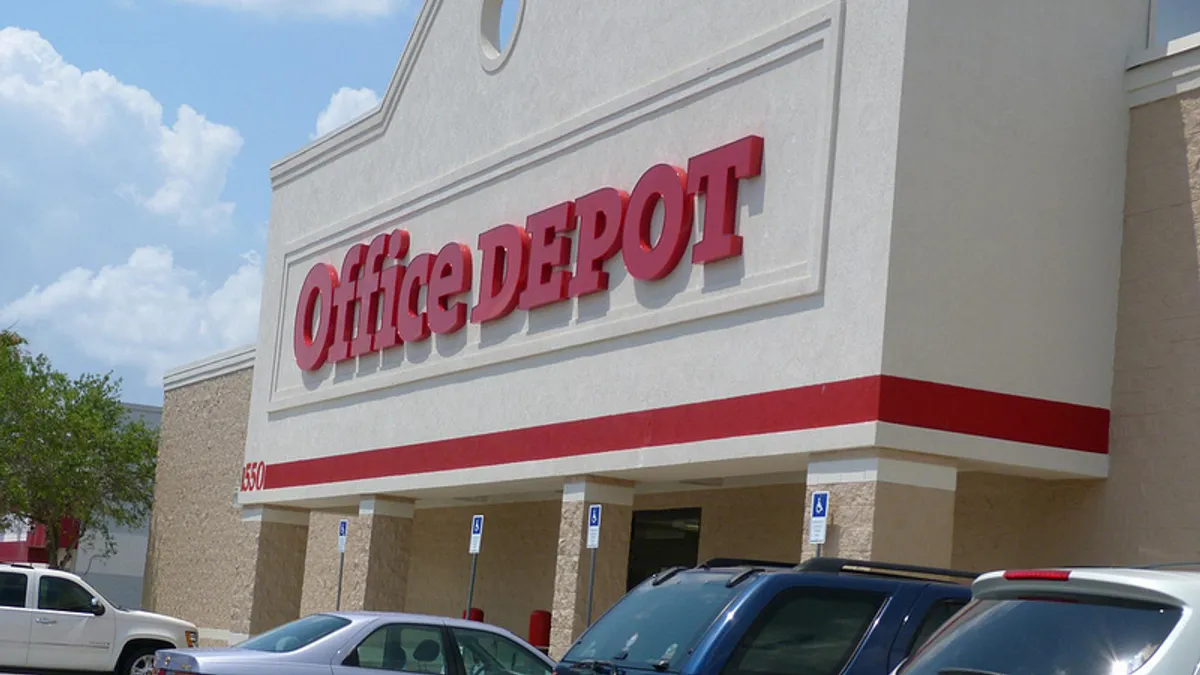UPDATE: June 7, 2021: The parent of Staples has made a $1 billion proposal to buy the consumer business of ODP Corporation that would include the Office Depot and OfficeMax retail business, according to a press release.
ODP, which has rebuffed a takeover offer from Staples once this year and announced plans to split its retail unit from its B2B contracting business, acknowledged that it has received Staples' new offer and is "carefully reviewing" it. In its letter to ODP, Staples signaled that it was prepared to bypass ODP's board with an offer to stockholders "unless our negotiations for a consensual alternative transaction as proposed herein are successful."
Dive Brief:
-
Office Depot on Tuesday turned down Sycamore-owned Staples' $2.1 billion acquisition offer from last week, but Office Depot Chair Joseph Vassalluzzo did outline ways the two might combine retail operations.
-
In a letter to private equity firm Sycamore Partners' Managing Director Stefan Kaluzny, a member of the board at Staples' parent company, Vassalluzzo said the Office Depot board had "unanimously concluded that there is a more compelling path forward," including "combining our retail and consumer-facing ecommerce operations with Staples under the right set of circumstances and on mutually acceptable terms."
-
Office Depot is moving ahead with a sale of CompuCom, after a strategic review of the IT services unit, which the retailer bought in 2017, Vassalluzzo also said.
Dive Insight:
In 2016, in denying Office Depot and Staples an opportunity to merge, a judge didn't buy the argument that there was any more competition in the office supplies and services than at the time of their 1997 attempt, despite Amazon's strong entry into the space.
Any further endeavor to tie up would invite antitrust scrutiny, especially as proposed by Staples, Vassalluzzo warned in his letter. He said the offer as it stands would expose Office Depot to "material uncertainty, significant financial burden, and the risk of significant damage to [the] business in the event that regulatory approvals could not be obtained, as the experience of our prior failed transactions has shown."
Vassalluzzo called on Staples "to expressly address the regulatory uncertainty by committing to bear the risk of potential antitrust obstacles or required remedies through a customary 'hell or high water' provision," if it insists on going forward with its plan as-is. That would require Staples to take on the responsibility of any antitrust risk, including any litigation or divestments.
Presumably, there would likely be closures of stores in areas where the two overlap. Office Depot runs 1,200 stores, while Staples runs 1,068. Meanwhile, Office Depot is going forward with its sale of CompuCom and its work growing its business services, per the letter.
"What we do not plan to do, however, is engage in a transaction that, as history has shown, would likely result in a prolonged and expensive regulatory review process with no guarantee of success, without a commitment that Staples is willing to bear this risk through a customary 'hell or high water' provision," Vassalluzzo said.
Staples didn't immediately return a request for comment on the Office Depot letter.
Vassalluzzo did describe two potential ways forward, however. One would be a joint venture, which he called "a viable path toward maximizing synergies and efficiencies for both companies." The other would be "an acquisition by Staples of [Office Depot's] retail and consumer-facing ecommerce operations for a price that enables our shareholders to benefit from such synergies."
While even those options would still invite antitrust scrutiny, as "retail-only" possibilities they hold "significantly lower" regulatory risk, he said.
"A transaction with you that is limited to our retail and consumer-facing and ecommerce business would eliminate the time, complexity and uncertainty created in your proposal by the need to identify a suitable third-party buyer willing to acquire the B2B Business on terms that would be mutually acceptable to our respective companies," Vassalluzzo said in his letter. "Our proposed alternatives would also create a competitor in a dynamic business environment that would greatly benefit consumers."

















